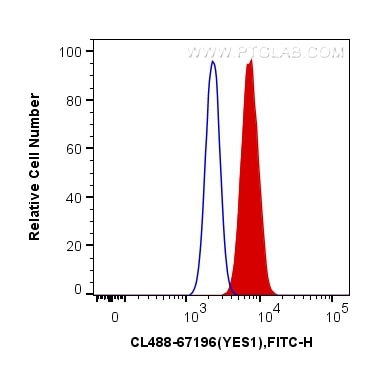Validation Data Gallery
Tested Applications
| Positive FC (Intra) detected in | HepG2 cells |
Recommended dilution
| Application | Dilution |
|---|---|
| Flow Cytometry (FC) (INTRA) | FC (INTRA) : 0.40 ug per 10^6 cells in a 100 µl suspension |
| It is recommended that this reagent should be titrated in each testing system to obtain optimal results. | |
| Sample-dependent, Check data in validation data gallery. | |
Product Information
CL488-67196 targets YES1 in FC (Intra) applications and shows reactivity with human, rat samples.
| Tested Reactivity | human, rat |
| Host / Isotype | Mouse / IgG2a |
| Class | Monoclonal |
| Type | Antibody |
| Immunogen | YES1 fusion protein Ag5016 相同性解析による交差性が予測される生物種 |
| Full Name | v-yes-1 Yamaguchi sarcoma viral oncogene homolog 1 |
| Calculated molecular weight | 61 kDa |
| Observed molecular weight | 62 kDa |
| GenBank accession number | BC048960 |
| Gene Symbol | YES1 |
| Gene ID (NCBI) | 7525 |
| RRID | AB_2923764 |
| Conjugate | CoraLite® Plus 488 Fluorescent Dye |
| Excitation/Emission maxima wavelengths | 493 nm / 522 nm |
| Form | Liquid |
| Purification Method | Protein A purification |
| UNIPROT ID | P07947 |
| Storage Buffer | PBS with 50% glycerol, 0.05% Proclin300, 0.5% BSA , pH 7.3 |
| Storage Conditions | Store at -20°C. Avoid exposure to light. Stable for one year after shipment. Aliquoting is unnecessary for -20oC storage. |
Background Information
YES1, also named as p61-Yes and YES, belongs to the protein kinase superfamily, Tyr protein kinase family and SRC subfamily. It promotes infectivity of Neisseria gonorrhoeae in epithelial cells by phosphorylating MCP/CD46. YES1 catalyzes the reaction: ATP + a [protein]-L-tyrosine = ADP + a [protein]-L-tyrosine phosphate.
Protocols
| Product Specific Protocols | |
|---|---|
| FC protocol for CL Plus 488 YES1 antibody CL488-67196 | Download protocol |
| Standard Protocols | |
|---|---|
| Click here to view our Standard Protocols |
